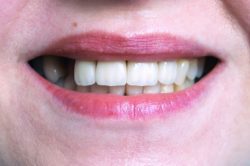Losing one or more teeth can be a difficult journey. Not only do missing teeth alter your smile and confidence, but they can also cause more dental problems. Missing teeth are not the end of your process. Truthfully, it is only the beginning.
If you lose a tooth, you have to find a replacement quickly. Your teeth work together as a unit. When one tooth goes missing, the others try to pick up the slack. Fortunately, there are many different tooth replacement options available from your dentist. If you are missing one tooth, you may be a candidate for dental implants or dental bridges. Both are permanent, long-term options. If you have more than one missing tooth, you can talk to your dentist about dentures or dental bridges.
Regardless of your chosen tooth replacement, it would be best if you made a decision quickly. Otherwise, you may experience even more dental issues.

Shifting or Missing Teeth
The way your teeth sit in your mouth functions with purpose. Each of your teeth needs the others for support. When you lose one tooth, your other teeth will make up the difference. Unfortunately, this means that your teeth may begin to move out of place in order to help your mouth function.
A shifting bite can create numerous problems. For example, your teeth can experience premature wear and tear if they shift out of place. Rather than striking the correct places, your teeth may hit the points or ridges of your teeth. Not only does this cause erosion over time, but this can also create fractures or chips in your teeth. Additionally, tooth erosion can increase your risk of developing tooth decay since the enamel is not strong enough to prevent bacterial infection.
Another side effect of missing teeth is that your bite becomes looser. This means that your teeth will loosen if they do not have the support of all your other teeth. If you have loose teeth, you can also increase your chances of losing more teeth. Therefore, one missing tooth can turn into many missing teeth.
Jaw Pain
After losing one or more teeth, you may notice pain or discomfort in your jaw. Several things can cause this problem. For example, shifting teeth can cause a bad bite or misaligned teeth. When your teeth shift, they don’t strike each other properly. Consequently, your jaw will try to make corrections. This can cause the muscles in your jaw to overwork, leading to tension or a condition known as TMJ. TMJ occurs when there is a malfunction in the jaw joint, muscles, or tendons. This can cause pain in your jaw, neck, and face.
Additionally, you can experience more severe side effects. Much like your teeth, your jaw needs the support of all of your teeth. When you have missing teeth, you can develop bone loss or deterioration. This is because your bones require the pressure and force of your teeth for stimulation. So, when you have missing teeth, your jaw lacks support and can deteriorate.
